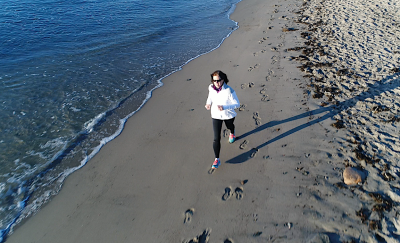
Visit Blue Cross' new health news site, Coverage, for compelling original reporting on health and wellness issues. Sign up to get our weekly headlines in your inbox!
Anne Palmer is an avid volunteer.
She created her own 24-hour skateboard-riding event to support cancer research and treatment.
She has volunteered at the annual Pan Mass Challenge bike race and run road races to support Dana-Farber Cancer Institute.
And she has painted bedrooms at the Cape Cod Adolescent Treatment Center group home, rallied her coworkers to donate a mountain of Christmas presents to the kids who live there, and helped Catholic Charities distribute turkeys and all the fixings so those in need could enjoy a Thanksgiving feast, among many other service projects.
And Palmer has done all of this while fighting cancer.
“I know there are people who are less fortunate than I am, and I want to help,” said Palmer, seen above running on a beach near her home in Massachusetts. “I’m very fortunate that I have minimal side effects from my treatment. I have a lot of energy, and I want to give back.”
Palmer said the good vibes she gets from volunteering are what motivate her to continue to serve.
“The feeling of helping others is amazing and it lasts a long time,” she said. “And I see the ripple effect it has on others.”
Volunteering’s health benefits
Palmer isn’t alone in noticing volunteering’s benefits—researchers have found that helping others is correlated with positive effects on both physical and emotional well-being and may even help people live longer.
“I was really interested to see if volunteering could somehow reduce someone’s risk for disease,” said Dr. Rodlescia Sneed, assistant professor of family medicine in the division of public health at Michigan State University’s College of Human Medicine-Flint.
Sneed’s research has shown that volunteering may help decrease a person’s risk of developing hypertension, which can lead to cardiovascular disease. Her study revealed that adults over age 50 who volunteered for at least 200 hours per year decreased their risk of developing high blood pressure by 40 percent compared to those who didn’t volunteer.
While we don’t understand exactly why volunteering is beneficial for people’s health, Sneed said, there are a number of possible factors. She notes that volunteering can help promote physical activity, reduce stress and create opportunities for social connection.
“To some extent, volunteering provides older adults who may be retired, bereaved or socially isolated with the means to replenish their social ties by going out and meeting new people,” Sneed said.
Other studies have linked volunteering to enhanced cognitive functioning and mood.
A study out of Indiana University–Purdue University Indianapolis showed that people who volunteer into old age are more likely to have improved cognitive functioning, which can stave off conditions such as dementia and Alzheimer’s disease. Researchers note volunteering provides opportunities for mental stimulation and building social ties.
“There is a theory that being involved in activities that are social where you use your mind in new and interesting ways can improve cognitive functioning,” Sneed said.
Studies have also shown volunteering’s correlation with reduced depression and improved emotional well-being. Researchers have seen a release of the mood-boosting brain chemical oxytocin, which is associated with social bonding, in volunteers.
“Doing volunteer work gives people a purpose in life, and that is linked to having better health overall,” Sneed said. “If you have something to get out of bed for, you’re more likely to take care of yourself and have a better sense of well-being.”
A little goes a long way
When it comes to volunteering, Palmer believes, a little can go a long way.
At a recent volunteer event with her Blue Cross Blue Shield of Massachusetts colleagues, Palmer spent an afternoon playing with kids at a local elementary school. “It was amazing to see these kids come up and give me a big hug at the end of recess, and I only played four-square with them for a few hours!” she said.
At Blue Cross, volunteering is a key “healthy living” value, said Corporate Citizenship Vice President Jeff Bellows.
“In 2018, more than 3,200 of our employees volunteered at nonprofits around the state as part of our BlueCrew volunteer programs,” he said. “That’s an incredible 85% of our company – and we believe it benefits our employees’ well-being as well as our community’s vitality.”
Palmer hopes her efforts will inspire others to volunteer: “Hopefully, I’m setting an example that the rewards of volunteering are endless.”
National Volunteer Week, April 7-13, is a time for organizations across the country to honor volunteers and recognize the irreplaceable impact of their time and energy all year round.
